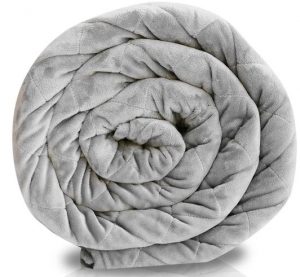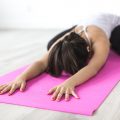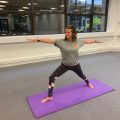Over the last year, after cutting out Topical Steroids I’ve really struggled with my sleep. Sometimes only getting a few hours, if that, and finding I finally drop off just hours before my alarm is due to go off.

There seem to be strange cycles of hives, night sweats and anxiety that plague me all night. Coupled with the fact that I’m Peri-menopausal and you’ve got some challenges on your hands.
Sleep used to be the only thing I was any good at. I used to fall asleep and wake as if no time had passed feeling refreshed and ready for the day. Now sleep eludes me I feel I’ve lost a super power. Everything becomes such hard work when you’re functioning on very little sleep.
And so I embarked on a mission to fix this, to find sleep again, because sleep is also essential for positive mental health, healing and particularly skin recovery during a gruelling journey with topical steroid withdrawal.
I did a lot of research and discovered lots of things that really work. Some of the below I’ve not tried yet, but I’ll make that clear. Many of them have made small little differences and some have been game changers. I hope some of these might help you and thank you to everyone who helped me by giving me advice on this from their own personal experience. Here goes. My 30 tips for a good night’s sleep..

- Weighted blankets – I’m trying this one at the moment and am about one week into testing, began using on about 24th January 2020. They can also be called anxiety blankets and have just the right amount of weight to calm you, relieve stress and so ease you into sleep. I’m using the Kalm Koala weighted blanket at the moment and will write a full review in a few weeks.
- Listening to sleep stories or music I highly recommend the Calm App. If you want a month free let me know as I can send you a link. Someone else recommended listening to Gayatri mantra, a Hindu meditation
- Read the book ‘Why we Sleep‘ by Matthew Walker – The new science of sleep and dreams – to get a better understanding of why it’s so important and what sleep does for us, the different stages of sleep etc.
- Listening to an audio book – as long as it’s not a grizzly, scary thriller, will relax and soothe you as you listen. One of the best things I did last year was investing in Audible. I am a little hooked but love listening to stories narrated to me. I have to admit that I often need to listen back a few chapters if I’ve fallen asleep, but it’s such a treat and they have loads of free audio books available.
- CBD Oil – I have tried this for a few weeks. I’m not sure if it worked and would like to try again for longer. However there are many reports that it helps to reduce anxiety for many and can help with sleep. Try CBD Gummies and if you’re interested.
- Read a book – just try to avoid really stimulating reading matter like horror or thrillers which might raise your heart rate.
- Get the Vagus/parasympathetic nervous system working – humming, singing, meditation can help with this.
- Herbal tea eg. Camomile or Sleep Tea at least a few hours before bed. This is also one of my nightly routines. I find it calming, and the cup of tea signifies I’m winding down and getting ready for sleep. Recently I discovered the Chuckling Goat sleep tea which really does help!
- Dormesan tincture from Dr Vogel – should aid sleep. I take this every night if I’m struggling to sleep.
- 20 Minutes meditation – Find a quiet space, sit with your back straight and either do a guided meditation or concentrate on your breathing and gratitude for 10-20 minutes before bed. Can work wonders if you can get into the mindset! I try to do a Calm guided meditation every day. Sometimes I spend the whole ten minutes scratching or trying not to scratch, but by the end of the meditation I have usually managed to find many moments of calm, and have also managed to slow my heart rate and sit and talk to my itch. Let it know it’s OK and that we can just be itchy, but that I am going to try to sill my twitching fingers none the less. Even a bad meditation is better than none at all and don’t beat yourself if it feels like it’s not working. Work at it and you’ll find it gets easier.
- Get into bed and lie still, arms by your side, on your back and slow your breathing. Try not to touch your skin, scratch or fidget, but don’t feel tense. The idea is to gently relax and sink into the bed
- Essential oils e.g. Lavender – these can be really calming. Put some on a hankie or on your pillow case. Try some Lavender linen sprays – but make sure it’s organic, natural and not full of chemicals
- Buy an oil diffuser – I have just bought an oil diffuser and they work really well, leaving a gentle aroma in the room. They’re also safe as they don’t involve any candles. You can add any essential oils of your choice; I am using Borage and Lavender at the moment. Thanks Jen for this recommendation.
- Cool temperature in your room – have a window open, turn off the radiator in your room and don’t heat your house at night. It’s far healthier to get warm from snuggling in bed and having a cool head outside the covers,
- Natural, cotton bedding – this should prevent you getting over heated. Synthetic covers and bedding that is too think and not breathable may make you overheat and sweat.
- Try sleep inducing tinctures e.g. Californian Honey by She is of the woods. This is a recommendation from an Instagram friend. I’ve not tried this but it’s on my list. Tinctures can work really well so try some, look for things that you like the sound of and do some research.
- Take Melatonin supplements – Not tried this myself but have heard from friends that it can really help with both sleep and anxiety.
- No Screen time, TV or computers for at least an hour before bed. You can set your phone to cut you off using screen time at a chosen time. I’m going to try this, but so far failing and I have to override it but I love this idea.
- Antihistamines if you’re really itchy, can make you drowsy too so if this applies to you, could be worth a dry
- Grounding sheet – I’m not sure how these work but have been doing a little research and I’m tempted to try it if I’m still struggling in a few months time.
- Make your bedroom a tidy, quiet, calm and peaceful place. Don’t work in your bedroom, try to keep it just for sleep. Make it an oasis of calm.
- Darkness – I also need the room to be as dark as possible, with blackout blinds and no blinking lights or technology glowing. Eye masks can help if you’re somewhere and cannot make it dark.
- Cuddling my huge teddy bear can help me feel soothed and calm. I know I’m a grown woman but it works for me, in the absence of a human!
- Fan – if you get hot at night, keep a fan by the bedside. I have this amazing cool neck fan which is pictured below. Easy to use and quiet, just don’t turn on the rotating light setting or that will wake you up!
- Get an old fashioned alarm clock – like the one pictured here. In this way you can try to banish the evil mobile phone from the bedroom and avoid the temptation to look, check and so wake yourself up again by stimulating your brain.
- Bandage up sore skin – I find this almost stops itching and allows me to sleep better. I also use tubular bandages most nights and the pressure of the tightness seems to allay many itching. It’s not a complete cure and I usually always have some kind of itch attack every night but I’m learning to cope with these better each time. I can stop myself, then try to touch the itchy areas with fluttery light touches, soothing touches and gently brush the itch away. Doesn’t always work!
- Yoga – do a short yoga session, working on gentle flows or some of your favourite positions. Choose relaxing postures and not awakening strong ones. I find this can really help me focus on the practise of yoga and so move me into a more tranquil mindset for sleep. I have been known to fall asleep on my yoga mat! To avoid this I try to remember to set an alarm
- Masturbation – OK don’t be shocked. Sometimes this can really help me relax when I’m particularly agitated. We all do it. And if you don’t you should.
- Assess your day and plan for tomorrow – I find it also helps me to review my actions for each day, tick off what I’ve done. Then spend a few minutes noting down the key actions for the following day. Note down anything that’s particularly worry you, a difficult task still to be completed and in this way you can leave it on the pages of your work book and hopefully not worry about it in the small hours.
- Have the intention to sleep – this is something I learnt from the book, The Miracle Morning. An absolutely brilliant book, but one which I failed to implement due to my truly shocking sleep. I hope with time and the constant improving of my sleep that I’ll get back to a place where I get enough sleep to start attempting a miracle morning again. I’d recommend this book to anyone wanting to get more done and start the day positively. The one key thing I took from it was that you need to believe you will sleep well and wake refreshed. Say it to yourself. Really believe it. Because going to sleep dreading the insomnia is almost a recipe for a bad night’s sleep.

So there you go. I’m sure there are more things you could try. But the important thing is not to stress too much about not sleeping. Go to sleep telling yourself you will get a good night’s sleep. Try to really believe it so that your body begins to expect it, rather than going to bed anxious night after night that you won’t sleep.
I’ve noticed that over the last few weeks things have started to get easier for me. My bedroom is tidier, and calmer. The oil diffuser is lovely. I’ve got a really good routine of having all chores and work done by about 8pm at the latest. So after that I’m just winding down. Sometimes I watch Netflix, but the best thing for me is to do a ten minute guided meditation, then read before I go to sleep. When I feel I’m getting tired the final routine is a bedtime sleep story from Calm. These really help me to slide off into the land of nod.
I hope these tips help you too. I’d love to hear your tips. What helps you? and what has sparked your interest from the above?
Photo by freestocks.org from Pexels













The weighted blanked gets me to sleep fast, but I haven’t had a bad, itchy flare since I’ve been using it. I did however, just finish a steroid burst and am still using a topical steroid on the weekends.
Hi Mary, I ‘m so pleased to hear this. I can’t wait to try mine. A Birthday present to myself. I’ve wanted one for years but never felt I could justify it but now it’s on order I’m looking forward to testing it. Thanks so much for your comment. Are you trying to reduce your use of topical steroids? If so good luck! I’m one year into TSW and not looked back. It’s not an easy journey but well worth the effort and commitment.
Great tips, thanks Ruth. I am getting more and more people ask me about insomnia. I swear it’s our addiction to our phones messing with our circadian rhythms or something! I find insomnia is very often a blood sugar drop issue, especially if people are waking between 2-4am, and there are also biochemical imbalances that can be at play. Here’s my factsheet on it in case that also helps: https://purehealthclinic.co.uk/health-a-z/insomnia/. Good sleep is crucial to healing!
It’s definitely to do with our phones. I find that’s the hardest one for me to stick to. I use my phone to play sleep stories so it’s then next to me and a constant temptation. I do wake up at 2am.. most nights! And I’d never thought of food or blood sugar as playing a part. I will definitely be reading this guide to insomnia. Thank you so much for your comment. If you like me list I know I’m on the right tracks.
Ruth! Being naughty with no. 28!! Jks, good list there! Sleep tight xx
Number 28 isn’t naughty, everyone does it. Heh Heh. And if you’re feeling really anxious, overthinking or stuck in that itchy cycle, I find it can sometimes refocus the brain and give you a much needed release and outlet of intense sensation. Doesn’t always work but hey, you’ll have fun trying
That’s a very detailed and informative write-up. thanks so much for sharing your knowledge with us. This is very helpful to me. I would love to have an update on recent posts from your blog. Thank you
Thanks Malia, I’m so glad you found this helpful. You can sign up for my newsletter on the home page to stay up to date with new blogs as they come out. https://whatallergy.com/subscribe/
Some really good tips here, and getting a good night’s rest is essential so hopefully people find the methods that work for them. Melatonin is a good supplement to help how you fall to sleep a bit quicker, and magnesium is a good supplement too as it can help regulate the body’s natural melatonin production.
Thanks Jack, I’ve heard of Melatonin. It should definitely be added to the list. Not tried magnesium either. Thank you for sharing. My sleep is so much better now I’ve begun to see real healing from the TSW symptoms. Something goes on at night in the body that prevents sleep. So frustrating as you need sleep to heal and grabbing sleep in the daytime makes it hard to get your work done!
Many people wake up in the middle of the night because they become overheated and their eczema-related itching worsens. It’s really on body temperature and eczema is closely related. The hotter you become, the worse your eczema tends to be.
So true! I have to sleep with a window open most of the year, even in winter and having natural fibre bedding and making sure you are not too hot is key. it’s a feeding frenzy for itching! My sleep has improved so much though as my TSW has healed. I’d say it’s pretty normal now.